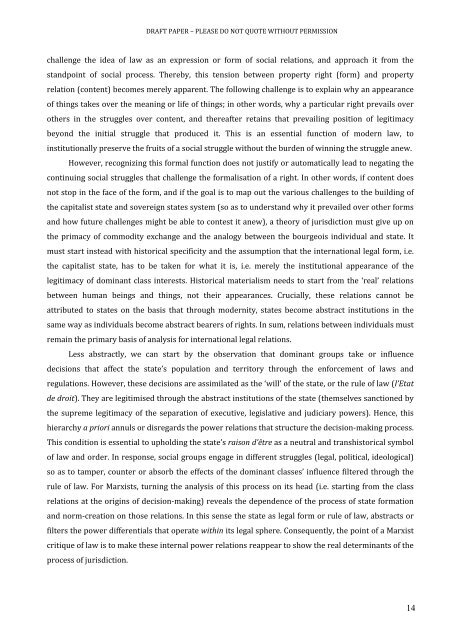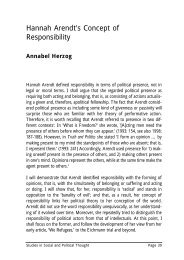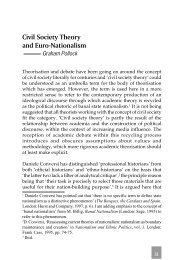Historical Materialism and International Law - University of Sussex
Historical Materialism and International Law - University of Sussex
Historical Materialism and International Law - University of Sussex
You also want an ePaper? Increase the reach of your titles
YUMPU automatically turns print PDFs into web optimized ePapers that Google loves.
DRAFT PAPER – PLEASE DO NOT QUOTE WITHOUT PERMISSION<br />
challenge the idea <strong>of</strong> law as an expression or form <strong>of</strong> social relations, <strong>and</strong> approach it from the<br />
st<strong>and</strong>point <strong>of</strong> social process. Thereby, this tension between property right (form) <strong>and</strong> property<br />
relation (content) becomes merely apparent. The following challenge is to explain why an appearance<br />
<strong>of</strong> things takes over the meaning or life <strong>of</strong> things; in other words, why a particular right prevails over<br />
others in the struggles over content, <strong>and</strong> thereafter retains that prevailing position <strong>of</strong> legitimacy<br />
beyond the initial struggle that produced it. This is an essential function <strong>of</strong> modern law, to<br />
institutionally preserve the fruits <strong>of</strong> a social struggle without the burden <strong>of</strong> winning the struggle anew.<br />
However, recognizing this formal function does not justify or automatically lead to negating the<br />
continuing social struggles that challenge the formalisation <strong>of</strong> a right. In other words, if content does<br />
not stop in the face <strong>of</strong> the form, <strong>and</strong> if the goal is to map out the various challenges to the building <strong>of</strong><br />
the capitalist state <strong>and</strong> sovereign states system (so as to underst<strong>and</strong> why it prevailed over other forms<br />
<strong>and</strong> how future challenges might be able to contest it anew), a theory <strong>of</strong> jurisdiction must give up on<br />
the primacy <strong>of</strong> commodity exchange <strong>and</strong> the analogy between the bourgeois individual <strong>and</strong> state. It<br />
must start instead with historical specificity <strong>and</strong> the assumption that the international legal form, i.e.<br />
the capitalist state, has to be taken for what it is, i.e. merely the institutional appearance <strong>of</strong> the<br />
legitimacy <strong>of</strong> dominant class interests. <strong>Historical</strong> materialism needs to start from the ‘real’ relations<br />
between human beings <strong>and</strong> things, not their appearances. Crucially, these relations cannot be<br />
attributed to states on the basis that through modernity, states become abstract institutions in the<br />
same way as individuals become abstract bearers <strong>of</strong> rights. In sum, relations between individuals must<br />
remain the primary basis <strong>of</strong> analysis for international legal relations.<br />
Less abstractly, we can start by the observation that dominant groups take or influence<br />
decisions that affect the state’s population <strong>and</strong> territory through the enforcement <strong>of</strong> laws <strong>and</strong><br />
regulations. However, these decisions are assimilated as the ‘will’ <strong>of</strong> the state, or the rule <strong>of</strong> law (l’Etat<br />
de droit). They are legitimised through the abstract institutions <strong>of</strong> the state (themselves sanctioned by<br />
the supreme legitimacy <strong>of</strong> the separation <strong>of</strong> executive, legislative <strong>and</strong> judiciary powers). Hence, this<br />
hierarchy a priori annuls or disregards the power relations that structure the decision-making process.<br />
This condition is essential to upholding the state’s raison d’être as a neutral <strong>and</strong> transhistorical symbol<br />
<strong>of</strong> law <strong>and</strong> order. In response, social groups engage in different struggles (legal, political, ideological)<br />
so as to tamper, counter or absorb the effects <strong>of</strong> the dominant classes’ influence filtered through the<br />
rule <strong>of</strong> law. For Marxists, turning the analysis <strong>of</strong> this process on its head (i.e. starting from the class<br />
relations at the origins <strong>of</strong> decision-making) reveals the dependence <strong>of</strong> the process <strong>of</strong> state formation<br />
<strong>and</strong> norm-creation on those relations. In this sense the state as legal form or rule <strong>of</strong> law, abstracts or<br />
filters the power differentials that operate within its legal sphere. Consequently, the point <strong>of</strong> a Marxist<br />
critique <strong>of</strong> law is to make these internal power relations reappear to show the real determinants <strong>of</strong> the<br />
process <strong>of</strong> jurisdiction.<br />
14
















